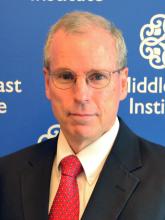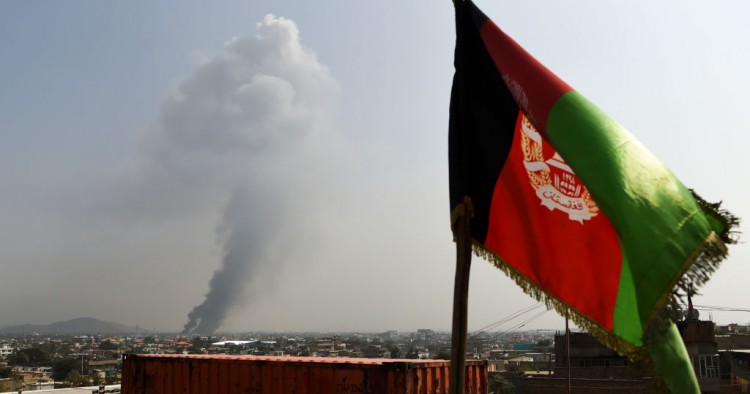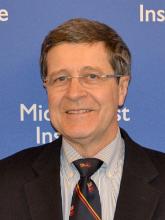This week's briefing on recent news and upcoming events in the region featuring Marvin G. Weinbaum, Robert S. Ford, Fatima Abo Alasrar, Jean-François Seznec, Michael Sexton and Eliza Campbell.
Trump calls off US-Taliban deal
Marvin G. Weinbaum
Director for Afghanistan and Pakistan Studies

President Donald Trump has scuttled a pending agreement hammered out over many months in Doha. In calling off a secretively scheduled meeting with a Taliban delegation at Camp David, Trump cited the killing last week of an American serviceman in a suicide car bombing in Kabul. As seen by the American president, the attack, only one of many recently, was evidence of the Taliban’s untrustworthiness and inability to carry through on an agreement.
Trump’s unexpected decision must be chalked up to his familiar spur-of-the-moment mode of decision-making. Before abruptly changing his mind, he was planning to host an event to rival President Jimmy Carter’s famed September 1978 Camp David peace negotiations between Anwar Sadat and Menachem Begin. It was apparently not the case that Trump had finally come around to the view that he was being asked to sign a bad deal. Nor was he noticeably moved despite finding himself surrounded by an impressive chorus of critics of a draft agreement seen as seriously flawed. While the full details remain under wraps, Trump was seemingly ready to accept an agreement that failed to ensure U.S. counter-terrorism forces and intelligence personnel could remain in place. He was also ready to agree to a ceasefire that only covered the tracks of a U.S. troop withdrawal. And rather than as promised conditioning an American troop exit on progress in intra-Afghan negotiations, the U.S. had been ready to specify a 16-month timeline for a full troop withdrawal. Trump’s 11th-hour decision to cancel the deal was, then, as impulsive as it was explosive.
Does this spell the end of discussions with the Taliban? Not necessarily. Both the U.S and Taliban could still use a deal. The Taliban, in participating in talks in Doha and elsewhere, have basked in the dividends of international recognition as a legitimate political alternative. The Pakistan-based leadership has discovered that diplomacy married with military pressure offers a promising path toward a return to power as an Islamic emirate. For his part, Trump would still welcome as a trophy he could carry into his reelection campaign having a negotiated agreement that would allow American troops to leave Afghanistan. But the president might also satisfy his political needs by pulling out almost all American troops without reaching a withdrawal deal. If this should occur, look for it to be preceded by a spike in U.S. military air strikes and bold claims about having already succeeded in meeting American strategic objectives.
Tunisians head to the polls amid political fragmentation
Robert S. Ford
Senior Fellow

Seven million Tunisians are registered to vote in next Sunday’s presidential election, the sixth time they will vote since their Jasmine Revolution in 2011. Unless one candidate wins more than 50 percent of the ballots on Sunday, the top two vote winners will then compete in a runoff election in November. Tunisians will also vote in new parliamentary elections in October. The busy electoral calendar comes amid public unhappiness about high unemployment and inflation and great fragmentation in the Tunisian political scene. There are 26 candidates competing in the first round of the presidential election. Among them are two women, including one who strongly supports the old Ben Ali government overthrown by the Jasmine Revolution. A businessman who has polled strongly is still a candidate even though he is now under arrest and under investigation for money laundering. Only one Islamist party, Ennahda, has a candidate who might be poised to reach the November deciding round by taking advantage of the many splits among more secular segments of the Tunisian political spectrum.
Millions of Tunisians have been watching televised debates between the candidates since Saturday evening; the last debate is tonight. The constitution makes the president primarily responsible for foreign and defense policy and the debates have largely revolved around those topics but have also included discussions about freedom of speech. A market analysis firm estimated that three million Tunisian voters watched the first debate Saturday night. The independent commission overseeing the election has recorded minor violations of the election law but says the electoral process is proceeding smoothly. There are a hundred European Union observers on the ground monitoring the campaign who will watch the Sunday vote. The question hanging over the presidential and parliamentary elections is whether out of the increasing political fragmentation a coherent new government arrangement can emerge.
Jeddah talks on Yemen cannot remedy mistrust
Fatima Abo Alasrar
Non-resident Scholar

Last month, a military confrontation between the internationally recognized Government of Yemen (GoY) and the Southern Transitional Council (STC) — a group that calls for self-determination — threatened to open a new front in Yemen’s civil war. Concerned by the escalation, the Saudi government called for a ceasefire and mediated between the parties in Jeddah last Thursday.
In a joint statement issued yesterday by Riyadh and Abu Dhabi, the regional backers emphasized the importance of maintaining a unified front against the Iranian-backed Houthis and “support for the legitimate government of Yemen,” and called on both sides to immediately cease “all military operations” and “stop media propaganda.” Although the GoY and the STC welcomed the statement, they are unlikely to abandon efforts to undermine each other.
The conflict in the South opened up deep wounds that will require more than the Jeddah talks to resolve. Public anger among GoY backers at the UAE for its support of the STC and airstrike against Yemen’s national army is unlikely to dissipate. Although the UAE claimed that the strike targeted terrorists, it may have targeted Islamists of the Islah party that the UAE, but not Yemenis, consider a terrorist organization. Absent an investigation, and a clear position by the Saudis on the airstrike, anti-UAE rhetoric will likely continue.
In a similar vein, it is difficult to see how the GoY could impose itself in the South as it already had a weak presence in the region. Moreover, a majority of southerners reject GoY forces deployed from neighboring northern cities, which they see as deepening their “occupation.” Suspicion of the GoY’s involvement in the Houthi-claimed attack last month that targeted southern leadership, and the GoY’s inability to empathize with the events, created even greater mistrust.
Moreover, many southerners and pro-STC affiliates see the UAE as an essential regional backer that can guarantee their safety from GoY retaliation. Continued demonstrations in support of the STC and the UAE, which draw hundreds of thousands from the South, are impossible to ignore. Many southerners view the UAE as a critical conduit that connects the STC with the rest of the world and can open up channels of dialogue with the Saudis, whom they want to win over. All this makes it clear that without a transparent strategy to remedy the mistrust among the coalition partners, skepticism that the Jeddah talks will have any long-term impact on the ground is certainly warranted.
MbS takes over the Saudi civil service
Jean-François Seznec
MEI Scholar
The removal of Khalid al-Falih from his twin roles as chairman of Saudi Aramco and minister of energy is a major defeat for the Saudi civil service. At Saudi Aramco he was replaced by a financier, the head of the opaque Public Investment Fund (PIF), the kingdom’s sovereign wealth fund chaired by Crown Prince Mohammed bin Salman (MbS), while Prince Abdulaziz bin Salman, MbS’ brother, was elevated to replace him at the Ministry of Energy. Some in the civil service, including at Saudi Aramco, would see their efforts as protecting the kingdom against MbS’ takeover of control over its most valuable assets. Saudi Aramco’s cash flow of over $250 billion per year is the largest of any company in the world. This cash flow, as well as the oil policy needed to maintain it, is now fully in the hands of the crown prince.
Falih’s long-term strategy for Saudi Aramco was to make it the largest international oil company-like player in the world, with major investments in natural gas, refining, and chemicals worldwide. This strategy would have transformed Saudi Aramco into a company like ExxonMobil or Total, but much bigger. Such a strategy, however, requires much of the capital that MbS needs to realize his plans to turn the country away from its dependence on hydrocarbons — at the possible cost of appropriating the cash which Saudi Aramco needs to remain the most professional of all the national oil companies. MbS can now direct most of the kingdom’s oil earnings to the PIF and from there to investments in non-oil-related businesses, some of which are high-risk, no-return investments in companies like UBER and Tesla or the robot city of Neom closer to home.
A further fear is that even Saudi Aramco’s cash flow will not be enough to quickly achieve the goal of diversification. If so, MbS may next turn his sights on the last bastions of independence in the civil service, the Ministry of Finance and the Saudi Arabian Monetary Agency, which would give him full control of the country’s cash reserves of around $500 billion.
Chinese cyber espionage raises difficult questions for Arab leaders
Michael Sexton and Eliza Campbell
Co-directors of MEI's Cybersecurity program
Detailed reports by Google’s Project Zero and Volexity revealed a Chinese cyber espionage campaign wherein Uighur community websites were compromised to deliver malware to their visitors. The campaign underscores difficult moral questions for Arab leaders balancing the fruits of Chinese investment with the crackdown on the Muslim ethnic minority in Xinjiang Province.
As Veloxity reported, the websites compromised for this campaign are blocked in China, meaning that the individuals surveilled were travelers and those in the Uighur diaspora. Middle Eastern countries, many with small ethnic Uighur minorities, must contend with Chinese surveillance within their territory even as they are increasingly recipients of Chinese investment and 5G infrastructure. This heightens the stakes for Muslim leaders when responding to China’s suppression of Uighurs in Xinjiang and in the diaspora.
The flip side of this dilemma is Arab states’ race for domestic development to modernize their economies and compete in a world transformed by automation, interconnectedness, and climate change. Many of the states that have expressed support for China’s crackdown also have “Vision 2030” development plans that emphasize the need to grow non-petrochemical industries and transition into knowledge economies. If these states are serious about their economic development plans, risking Chinese investment and technology creates its own strategic complications. (Neither Google’s report nor Apple’s public response mention China; both are working hard to maintain a significant presence in the Chinese market.)
Photo: WAKIL KOHSAR/AFP/Getty Images
The Middle East Institute (MEI) is an independent, non-partisan, non-for-profit, educational organization. It does not engage in advocacy and its scholars’ opinions are their own. MEI welcomes financial donations, but retains sole editorial control over its work and its publications reflect only the authors’ views. For a listing of MEI donors, please click here.














